
Reaction to the mini-budget
No sugar-coating from The Sun
What makes a good journalist? Or a great editor? The questions arise in part because of this week’s love-bombing of outgoing Times editor John Witherow and his successor Tony Gallagher. Both are being described as great journalists, exceptional leaders etc etc.
But I had already been pondering qualifications for the “good journalist” epithet after looking at coverage of Kwasi Kwarteng’s “fiscal event”. An inquiring mind is usually at or near the top of the list. I would argue that it should be joined by an open mind; an ability to put preconceptions aside and view events from all angles to give your audience the most rounded picture.
This should be the big sell for mainstream media, the proof that they have something better to offer than social media echo chambers where – unless we try very hard – we can’t help but find ourselves in like-minded company, sharing similar thoughts and entrenching our world views.
What a shame, then, that our newspapers don’t play to and develop that strength. Instead, they are hooked on self-reinforcement: slanting stories to fit predetermined agendas, seeking out evidence to prove the virtue or villainy of a very narrow cast of characters. And the obverse: stifling inconvenient developments.

It was refreshing, therefore, to pick up yesterday’s Sun, with its “Bricking it” splash on the prospect of much more expensive mortgages. The decision to lead on the issue surprised me and I expected the paper to airbrush the cause of those fears, to project the idea that nasty “markets” or other outside forces were responsible. But it didn’t. Inside was a spread that did not shy away from the fact that the prospect of dearer home loans was largely at the door of our new prime minister and chancellor, pictured in hard hats in hi-vis jackets that could not shield them from the frightening numbers surrounding them. “Home groan” was the perfect double-meaning pun headline. It would be good to think it was intentional.
This from the paper that three weeks earlier had welcomed “the radical PM we need for this crisis”. To be fair, Saturday’s leader – after the Kwarteng statement – reiterated that sentiment, although this time it added “Buckle up. It could be a bumpy ride.”
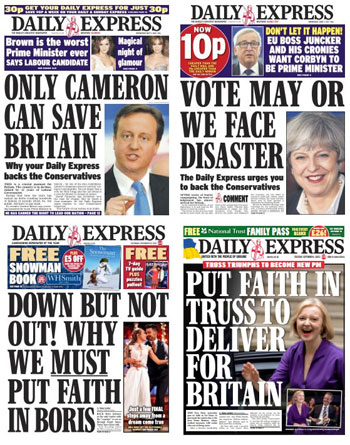
It already is. And this morning, the paper put its finger on one of the reasons: Kwarteng’s “inexplicable” failure to show his workings. It’s all about accountability. Johnson was a master of circumventing scrutiny by parliament, but his administration, with Sunak in the Treasury, understood that scrutiny by the markets is unavoidable. The Sun and Express may urge voters to have blind faith in whoever is the current Tory leader, but the markets don’t have to do that. And they won’t. If a week is a long time in politics, an hour is a long time in the markets. For a prime minister and her chancellor to disappear from view after such an explosive announcement and then tell everyone they must wait two months for an explanation of how their policy will work was a recipe for disaster.
Yesterday’s Sun highlighted one of the consequences of the new Downing Street team’s approach – as did its Tuesday spread on the plunging pound – without sugar-coating. It didn’t try to pretend there weren’t unpleasant side-effects or to shift responsibility for them. Quite grown-up.
Even-handed approach from some…
Other papers with a stronger reputation for even-handedness – the FT, the i, the Times – might all have been expected to take a generally neutral stance and they did take a stab at impartiality, but all seemed concerned. The words “audacious” and “gamble” were everywhere.

The i had been sounding alarms even before the Queen was safely in her St George’s Chapel vault, starting with “Mortgage hike for millions” the Saturday before last, through warnings on “Truss gamble” on Thursday and “Millions face mortgage hike” before the speech was delivered on Friday. Since then, we’ve had the pound plunging, Tory jitters, mortgages being blocked and warnings being “ignored”. [Incidentally, that headline was a no-no in my book: the fact that warnings and advice are not heeded or taken does not necessarily mean that they have been “ignored”; it may be (and most likely was in this case) that the person being warned and advised decided “I hear what you say, but think you are wrong and am going ahead anyway.” That’s not the same as taking no notice. “Defied” might have been a better word.]
Anyway, back to the i’s coverage. The general conclusion is that it didn’t like Mr Kwarteng’s package. But it did take the trouble to explain the rationale behind what he was doing and what he was seeking to achieve. It also gave space to people supporting his strategy. The same applied to the FT. The Times meanwhile ran a spectacularly fence-sitting Saturday leader that might have been the product of the upcoming change of editorship, with whoever was in charge on Friday perhaps concerned about upsetting either the incumbent or his successor. I suspect the paper would have been more forthright about what it thought – and very possibly have reached a different conclusion – had either Witherow or Gallagher been established in the chair that night and for the foreseeable future. The leader approved of all the individual measures and then failed to decide whether the sum of the parts would be success. A William Hague oped was virtually a mirror image, listing all the worries before failing to decide whether these would add up to disaster. The balance of opinion on the letters page was in favour of the chancellor, but there were far more people in the news and business pages coming out against.
Metro, as ever, also made a fair fist of telling it straight, while the Star, as ever, made a clown of the latest Tory minister in its sights.
… less so from others
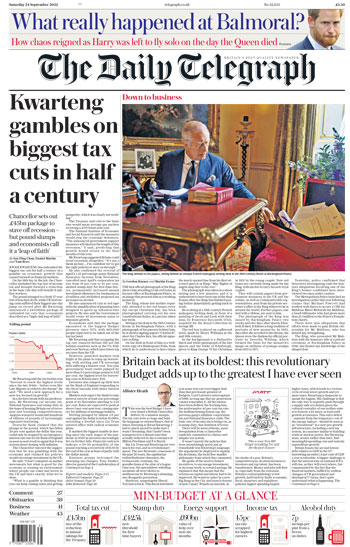
Which takes us to the partisans. The Telegraph’s Saturday splash intro scored 11/10 for telling it how it is: “Kwasi Kwarteng has unleashed the biggest tax cuts for half a century in a gamble on economic growth that caused turmoil on financial markets.” That’s what we want. News on the news pages, opinion in the comment section.
These days, of course, comment is never restricted to the middle or back of the book. So here, too, on the front was Allister Heath (the editor of the Sunday Telegraph) declaring the non-budget to be the “greatest budget I have ever seen”. Heath was quite beside himself with joy that “hardcore, unapologetic liberal Toryism” was back, and delighted in taking swipes at the Bank of England and leftist propaganda, “including by supposedly Tory governments” – could he possibly mean the Cameron, May and Johnson administrations his papers had urged readers to support?
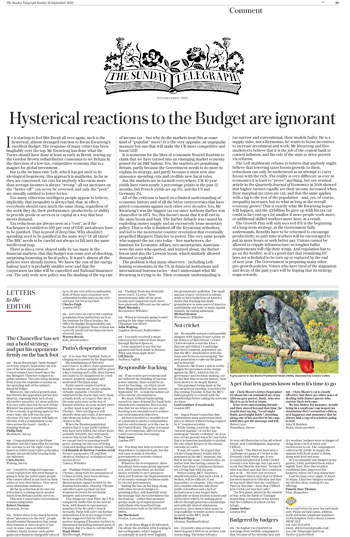
Inside news pages brought a succession of positive headlines from “Fairytale budget delights the Right” to “Glass half full” on the price of a pint. Truss’s “favourite” economist and inspiration Patrick Minford has a column to assert “The only crisis this revolutionary step will cause will be among those who talk Britain down”. (Where have we heard that phrase before?) The leader, too, was full of enthusiasm.
Next day, Heath’s Sunday was in belligerent mood after all the flak, running a leader describing the “hysterical, almost deranged, reaction to Kwarteng’s excellent Budget” as ignorant and over the top. But by Monday, with the pound falling to its lowest level against the dollar for 50 years, the daily was moved to run a full page column by Ambrose Evans Pritchard saying, “This clusterbomb of tax cuts is a reckless gamble”. After that, inside coverage of the non-budget and its fallout was consigned to the business pages, where more specialist commentators voiced concerns, while the write-about-all-subjects commentariat on the oped, like Sherelle Jacobs and Charles Moore, remained bullish.
The Express goes all-in

The Express was, of course, fully behind this latest dawn of a new era that would be full of great bounty and wealth and riches. Just as it was behind the new eras of May and Johnson (having previously supported Cameron). And there I was thinking that the same party had been in government since 2010. But even the good old Express couldn’t escape the notion that it was all a bit of a gamble – as in its “We’ve got the courage to bet big on Britain” post-statement splash.
Day after day, page after page, came the cloying boosterism. “Britain back on top”, “Chancellor off to a flying start”, “Truss pledges to build world-beating economy”.
It even told readers: “Energy bills set to fall by £1,400 this year.” That, I’m afraid, is a downright lie and should be reported to Ipso. If I’m paying £1,900 for my fuel today and will pay £2,500 when the energy cap rises on Saturday, that is a £600 increase. And if I was paying the maximum £1,300 in January, my bills will have gone up by £1,200 this year. The government may give me some money towards this, taking my hit to £800, but still my bills won’t have fallen. A freeze that is preventing my having to pay £4,000 in the winter does not constitute a “cut”. And while we’re at it, corporation not going up as intended doesn’t constitute a cut either. Other than in projected Treasury income.
The Mail finds other people to blame

Finally, on this side of the political fence, came the Mail. It could hardly contain its excitement on Friday at the prospect of “Biggest tax cuts for 30 years!” And when there were even more giveaways than predicted, it celebrated on Saturday with both an exclamation mark and an underscore in “At last! A true Tory budget”. Although there was more underlining on page 18 in a moment of reflection that asked, “As pound dips, experts ask ‘how will Kwasi pay bill?’” There might be squalls, but the paper is definitely on the side of the “brave, radical, TRULY Tory PM no one saw coming” (especially when she was campaigning for Remain).
Monday’s paper was an exercise in shameless unsubstantiated propaganda with the splash “Kwasi’s boost for families”. This was based on the chancellor’s promise that he would “go further” and a load of speculation as to what that might mean. And when the pound tanked after the weekend, there was “Fury at City slickers betting against UK plc”. The fury in this case coming from a couple of Tory MPs, one of whom seems to have misunderstood the quote he was supposed to be renting out, directing his ire not at “City slickers” but at that other favourite target, the BBC, saying, “I knew its reaction would be to talk the pound down”.

Now here’s the thing, the Mail doesn’t like bankers. It has run countless stories about their fat-cattery and greed. Yet this was a budget that will benefit bankers more than anyone else – since they are just about the only people who earn the huge sums that will reap the greatest benefits from Kwarteng’s largesse. So, it’s ok for them to get richer now? Just checking.
Also, just wondering whether Crispin Odey counts as “a City slicker”. Mr Odey has been shorting the pound for a long time. He was widely quoted yesterday as saying that he had been grouse shooting on Friday (because that’s what you do if you’re rich and have just got married) and had done no trading. Because he didn’t need to. He had already placed his bets and his hedge fund has made a “145% profit” this year (which means his money is now worth nearly two-and-a-half times what it was). He wasn’t mentioned in that Mail splash, but he did feature on the inside spread focused on those “Making money out of bad news”. He had, the paper reported, made a reported £220m from the collapse of the pound after the Brexit referendum. He also, the paper didn’t report, once employed Kwasi Kwarteng, set up Jacob Rees Mogg’s hedge fund, and made big donations to Vote Leave and Boris Johnson’s leadership campaign. All causes close to the Mail’s heart. But yesterday, even as he was blaming Remainers in the City for the run on the pound, he was deemed guilty of “shameless boasts” about his bets against “UK plc”. So, is he a goodie or a baddie?
Not forgetting the BBC and IMF
Perhaps yesterday wasn’t a day for blaming Remainers (just as Tuesday wasn’t supposed to be a day for blaming the BBC). It was the Bank of England’s turn for flak for “sleeping on the job”. And the IMF’s, for interfering – ie, doing its job. “Butt out of our affairs, IMF told” read the headline at the bottom of page 15 on the small story that was making rather a bigger impact elsewhere – such as the splash for the Telegraph. And who was doing the telling? Well, no one. One anonymous Tory MP did say: “At the end of the day it’s up to the elected government to set fiscal strategy. I’m confident ministers will deliver a growing economy.” That’s not quite the same thing.
It was, perhaps, unfortunate timing to blame the Bank, which that very day rode in to the rescue of pension funds to the tune of £65bn. The intervention makes the splash of every paper today – except the Mail.
Hey, look over there

But the Mail is becoming bored by all this. Time for a dead cat. Or a squirrel. Or a murderer. Yesterday’s splash was “Lawrence killer’s sickening selfies from his cell”. Because that was what Mail readers were worrying about most over their cornflakes, rather than the price of that breakfast and whether they’d be able to afford their mortgage or if they might end up in negative equity if the housing market crashed.
He was back on the cover this morning while inside there were promises (which other titles might see as threats) of billions of pounds of spending cuts to calm the markets and a desperate search for someone other than Kwarteng to blame for the latest turmoil. Tories were blasting the IMF after its warning “wreaked havoc”; another spread asked, “Is new risky type of trading by pension funds behind chaos?”
The Express took the same approach on Wednesday, telling readers to be sure to get their Covid booster and flu jabs – alongside a picture of Kate to cheer them up. But it was dragged back to the real news this morning: there’s little that matters more to the Express than pensions.
Those whitetop readers more concerned about a prisoner’s selfies than financial meltdown certainly wouldn’t be interested in a conference speech by the leader of the opposition, spelling out his plans for government. Because that will never happen. His party is only 33 points ahead in the polls.
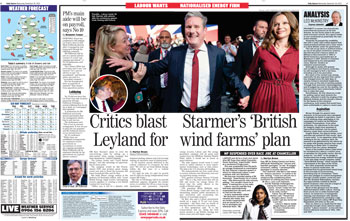
Both consigned that speech to the 8-9 spread. The Express had “Critics blast Starmer’s ‘British Leyland for wind farms’ plan” (whatever that meant) while the Mail speculated “Is Keir plotting a Lib Dem pact?” There were, the subhead said, “clues in the speech”, which took the form of ruling out a deal with the SNP. This was apparently enough to justify the intro: “Labour opened the door to a ‘grubby’ election deal with the Liberal Democrats…” I’m not sure why the word “grubby” is in quotes. Or indeed, why it is there at all. Nobody says it anywhere in the text. But the Mail has previously accused Labour and the LibDems of “grubby” and “undemocratic” collusion, apparently forgetting the five splashes it devoted to urging Nigel Farage to stand down his UKIP candidates in Tory-winnable constituencies in 2019.
The previous two days’ conference coverage had been relegated to pages 14 and 15, with Monday’s headline “Labour turmoil over income tax”, which you had to admire, given what was happening in the markets over income tax. There have, of course, been daily Labour-bashing leaders.
The Express and Telegraph have been using the same tactics. Tuesday’s Express said “Calm Kwasi” was going to unveil a plan to soothe nerves, while “Desperate Keir” was to claim he was the heir to Blair, while the Telegraph had Labour “divided over tax”.
Starmer relegated to inside pages
It has always seemed to me that the leader’s speech should be the one moment the opposition is guaranteed a place on all serious front pages. People deserve to be told what the alternative is – whether left or right, whether there is an election in the offing or not. When we are in the position we are in now, with a crisis swirling and opinion polls suggesting that there is every chance that leader might be in office before long, it should surely be even more of an obligation. Yet Starmer didn’t feature at all on the Times, Mail, Sun or Express front pages – even as a nib or a puff. That can’t be right. Congratulations, at least, to the Telegraph for making him the main picture. (The Times, like the Express, chose Kate. Haven’t we seen enough royals lately?)
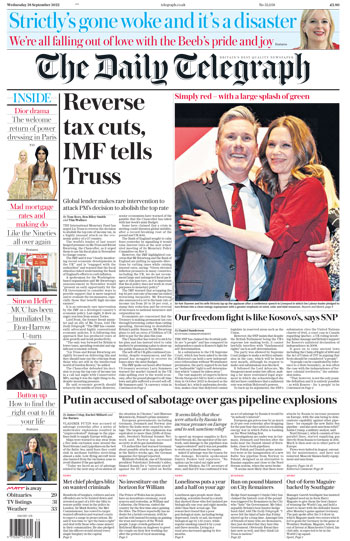
Not playing it straight
And that is what set me to the musing at the start of this notebook about “open minds”. When I say journalists should approach stories with an open mind, I’m not suggesting they should set aside all their experience. Naturally they should take into the room the background knowledge that leads them to expect events to play out one way or the other. But it’s quite another thing to go in with a predefined agenda, a determination to look for something to love or hate, a mindset ready to twist what is happening before their eyes into a desired shape. And we’ve been seeing that for far, far too long.
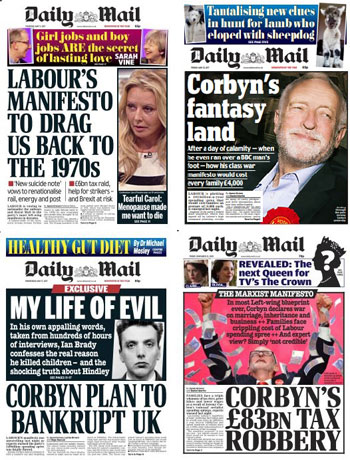
The Express used to lead on Nigel Farage’s pronouncements as though they were of biblical importance; it moved on to celebrating every utterance from Boris Johnson as proof of how great he and Britain were. The Telegraph got there before them on that when he was out of office, turning his weekly columns into regular Monday splashes – one man’s opinion being presented by the paper that called itself “Britain’s best quality newspaper” as the most important subject in the world that day. That was bad enough, but once Johnson was in Downing Street, the Murdoch papers and the Mail (when it suited) joined the fun, broadcasting his every thought as though it were a cast-iron certainty. And then it spread to other ministers. If someone said something you liked the sound of, however preposterous or unlikely, it got the full whistles and bells treatment.
Meanwhile, anything Labour came up with was either buried or delivered in “Look at this nonsense” mode. The Daily Mail has always been fiercely against excessive public borrowing. In the 2017 and 2019 election campaigns, it mocked Corbyn’s “fantasy economics” because he came up with plans that the paper calculated would cost £90bn. This was reckless and unaffordable. But now it is in paroxysms of joy over a Tory package that will cost well over double that.
Left-leaning papers at it too
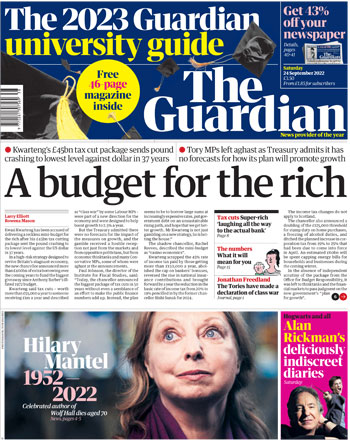
This isn’t a phenomenon exclusive to the right-leaning press. The Guardian and Mirror are equally guilty of their own game of flog, harry, avoid. The Guardian was unequivocal on Saturday with “A Budget for the rich”. The super-wealthy were laughing all the way to the “actual” bank; the Tories had made a declaration of class war. The paper did detect a skip in the step of some Oxford Street shoppers, but there were black clouds in front of every sliver of silver. And it did not hesitate, as right-leaning papers did, to point out that half the tax benefits would benefit the richest 5% of society. Since then, the paper has been flipping between all the good things Starmer’s Labour is promising and all the bad things that are happening under the Tories as Truss’s policy “unravels”. Again, unlike the right-wingers, it is happy to tell us about mumblings from backbench Conservatives, of letters already going into Graham Brady: “This madness has to end: Talk of new leadership contest in the air amid backbench fury”. Does it really think they’d do that?
Then there’s the FCA being urged to investigate short selling by Kwarteng allies. There didn’t need to be any collusion. The only thing in his statement that Kwarteng didn’t signpost in giant capitals beforehand was the abolition of the top rate of income tax. Truss had said time and again during the leadership campaign that she’d reverse the corporation tax and NI increases; the chancellor said he was going to lift the cap on bankers’ bonuses. We knew there would be an energy price freeze. All of this came out before and during the period of supposed political quietude during the official mourning of the Queen.
And as to those bankers’ bonuses. The optics are terrible. How rich do they need to be? How greedy are they? But it won’t cost the taxpayer anything. It might be a bad idea in the context of encouraging the sort of risk-taking that led to previous banking crises, but all the focus is on making the rich richer as though we were going to pick up the bill. If they are paid more, whether in salary or bonuses, presumably the exchequer will get more tax money – though at a lower rate than would previously have been the case. I think it’s that top rate of tax that has really irked people.
Mirror’s odd priorities
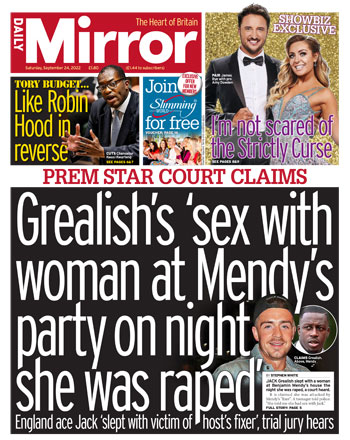
The Mirror meanwhile virtually abdicated on Saturday, shoving Kwarteng into a tiny corner under the titlepiece on a front page dominated by a footballer’s (alleged) sex life. While most papers of all political leanings gave the package four or five spreads and special supplements, the Mirror coverage was limited to the 6-7 spread, headlined “Hard up? Hard luck”, and a six-par editorial “Slap in the face of all of us”. Jack Grealish might be of more interest to most Mirror readers than Kwarteng, but for heaven’s sake!
As the sky started falling in over the weekend, it was back on Monday with, “Tax cuts for the rich are immoral”. Once again, football was the draw, since this was Gary Neville talking, in an interview in advance of his appearance at the Labour conference. To my mind, this was barmy. The Mirror, its readers and a huge chunk of the population might agree with that sentiment, but coming from the mouth of a footballer-turned-pundit, it doesn’t carry a huge amount of weight. It’s what you’d expect him to say. It’s what he was saying on Twitter two days before. If you like Neville or value his opinion, you’d already know what he thought – and if you didn’t know, you’d be able to make a very good guess. The far better sell line (imho) was the one inside: that tax cuts for “people like me” are immoral. We move away from the politics of envy to someone saying “I don’t deserve this”.
After that, there was more Labour conference and a positive oped and leader, as you’d expect.
Neville was back on the front the next day – in Kwarteng’s sub-titlepiece puff slot – this time with Starmer, having made his conference appearance. The splash was “Out of control” and the Tories’ “economic disaster”. The decline of the pound actually took precedence in the running order over the conference, but the two big stories of the day still had only one spread apiece. Labour did get two spreads yesterday, while the mortgage scare got one with a big ad on it.
I think it’s a big mistake to assume that your readers aren’t interested in politics and feed them just a few hundred words and a lot of big panels on the “big” occasions. Anyone wondering why ordinary working people voted for Brexit and why the Red Wall fell to Johnson would do well to compare the political coverage of the Sun and Mirror. If the latter really wants an end to Tory rule, perhaps it should encourage its readers to take an interest in policy-making and its effects rather than offer a pappy diet of footballers, sick children and old crimes.
Celeb views
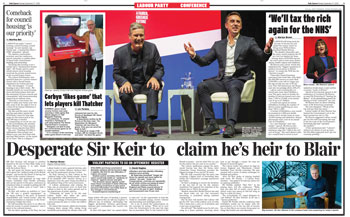
Gary Neville’s appearance with Starmer in Liverpool garnered a fair amount of coverage across Fleet Street, which was reasonable given that he was up there on the stage. That, I guess, justified the Mirror pre-conference interview. But it set me pondering about how much store we should set by what people famous in other walks of life have to say about politics. I’m not saying politics should be left to politicians. It certainly shouldn’t. But fame in one sphere does not confer wisdom in another and I don’t think the press should pretend it does.
I’ve got a lot of time for the two footballing Garys – Neville and Lineker – and enjoy their observations on Twitter about life in general. They get right up the nose of the Mail, of course, which has a difficult line to tread. It wants them – and bleeding-heart luvvies – to put a sock in it, but there’s that awkward thing called free speech. The same could be said for my attitude to Ian Botham and Roger Daltry. I don’t care what they think about anything, but they are entitled to their opinions.
The problem comes, I think, when these people’s views are put out as sort of proof that this is what we, the reader, should be thinking. I didn’t think “Beefy comes out for Brexit” was a valid news story and so I have to apply the same standards to Neville and the Tory budget. Botham is now, of course, in the Lords, so what he says has some influence. And if Neville is tempted into politics, as I suspect he might be, the same would be the case.
It’s good to be alert to possibly up-and-coming politicos – think Reagan, Eastwood, Schwarzenegger, Bono in America, Seb Coe and Gyles Brandreth over here – but most famous pontificators aren’t. So how about treating their thoughts in the vein of “here’s someone with something interesting to say” rather than “here’s someone famous you like, listen to him”.
Abbey behaviour
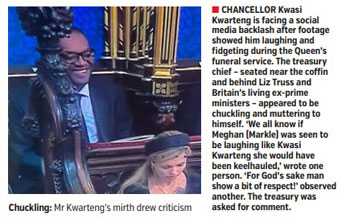
Since the last Notebook was entirely devoted to the death of the Queen, I’m going to back off coverage of The Queue and The Funeral. Suffice to say, I was pretty well glued to the BBC last Monday. But I did just want to mention one thing. That man Kwarteng again.
There he was in the Abbey, apparently taking a phone call and laughing out loud. Three times. Television footage showed Carrie Johnson in front of him looking not best pleased.
The next day’s papers printed hundreds of pages of pictures and commentary. We had curtseying horses, sad corgis, gun carriages, lots of women in black, pageantry, lone pipers, the whole gamut. But not Mr Kwarteng.
Metro caught up on Wednesday, saying he was taking a pasting on social media. The Sunday Times asked what he found so funny. And the Mirror headlined a Friday comment piece about the TV coverage “Watch & learn, Mr Kwarteng” (an ampersand in a headline???), presumably as a reference to his fidgeting, even though he wasn’t mentioned in the text.
Maybe others thought that carping would soil the solemn tone of the funeral pages – they did, after all, manage not to have a dig at Meghan until the next day – but I wondered at the time, and still do, what they would have done had it been, say, Diane Abbott behaving like that. Except she never would.
New editor at The Times
John Witherow

Let’s go back to where we started and the News UK love-in for John Witherow and Tony Gallagher. As an old Times hand, people have been asking me what I think about the change. So here’s my two-penn’orth:
First off, I have never worked for either, although I did sub Witherow’s copy when he was despatched to the Falklands in 1982.
He was certainly instrumental in improving the fortunes of both the Sunday and the daily in his 27-year innings, achieving what in the whole of my time at the daily seemed impossible: bringing them into profit. So he must have been doing something right.

Exclusives on his watch included the first interview with Donald Trump after his election (although the paper failed to mention that Rupert Murdoch was in the room watching Michael Gove in action), an assortment of tax and sex investigations and Anthony Loyd’s discovery of runaway Isis bride Shamima Begum in a Syrian camp.
I thought he was bold to back Remain in the referendum, knowing his proprietor’s extreme Euroscepticism, and upstanding in challenging Johnson’s performance and behaviour – having previously backed him both as Tory leader and prime minister – while other editors doubled down with their sycophancy, even in the face of the mountain of evidence of incompetence and untruthfulness.
When I contacted him to discuss his paper’s approach to various issues, he was generous with his time and open in answering my questions.
Friends who worked under him described him as a bully who wouldn’t brook dissent. I don’t know about that, but I do know that almost every editor described as “great” has also been denounced as a foul-mouthed, intolerant megalomaniac (Harry Evans perhaps being the exception).
I also believe that there were some big blots on his record – how could there not be missteps in such a long career at the top? He wrongly claimed that Michael Foot was a Russian agent, and then repeated the libel years later, when he was safe from legal action because Foot was dead, claiming that he had been right all along. It’s hard to find others who think he was.
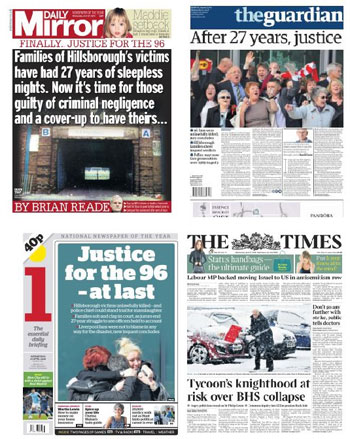
We all make bad calls, but to keep the Hillsborough inquest verdict off the front page – the earliest mention was on page 12, I think – was a pretty bad one. Especially given News International’s part in the story and the ongoing boycott of the Sun in Liverpool. (The Sun, then edited by Gallagher, also kept the story off the front, but you can kind of see – if not agree with – the reasoning behind that.) He lost a valuable member of staff over that. I remember being invited to discuss the omission on Radio 5 – it was that surprising that it was deemed worthy of a segment on a programme about the 96’s fight for justice. The MP Jerry Hayes, with no knowledge of the decision-making process, defended Witherow, saying he was an old pro who wouldn’t have been involved, that some junior journeyman had let him down. That couldn’t have been further from the truth: Witherow had decreed that it was an “old” story not worth the cover and would not listen to the many voices urging him to reconsider. Some put it down to his dislike of football; others to a dictatorial arrogance. More recently, I thought his anti-trans agenda, which has spilt across Fleet Street, was cruel and disproportionate. And the little white girl “forced into Muslim foster care” was a disgrace.
Tony Gallagher

Witherow’s Times is less tolerant and more right wing than the one I worked for under his six predecessors, but it is still just about holding the centre ground, still publishes columns expressing a diversity of opinion, still has an endearing quirkiness (News Corp CEO and former Times editor Robert Thomson would call it “puckish”), and still has a fundamental decency amid all those pictures of ballet dancers.
Will that continue to pertain under Gallagher, who as Sun editor used immigration as a weapon to fight for Brexit and celebrated his role in that referendum result by sending a message saying, “So much for the waning power of the printed press”?

Murdoch described him yesterday as “an exceptional editor with an expert and experienced eye on creating the best news package”.
He was certainly a successful editor of the Telegraph – although his high point at that paper must have been as deputy editor, overseeing its extraordinarily good exposure and coverage of the MPs’ expenses scandal. I thought it a shame when he was fired and don’t think the paper has ever been as good since his departure.
He was less of a good fit at the Sun and there were constant rumours of moves to unseat him. He was deemed by many to be overly interested in politics and didn’t seem able to foster the smart cheekiness that had characterised the paper under previous editors. Imagination and humour appeared to be limited to tortuous puns – a failing that survives to this day, years after his departure.
All of these thoughts are the result only of reading the papers produced by these two men, not from any first-hand knowledge of working with or for them. I have had only one direct experience of Gallagher: I challenged him on Twitter when the Sun led with a picture of seven-year-old Kai Rooney in tears after England lost to Iceland in the Euros, three days after the referendum. The caption, describing the boy as “distraught”, might perhaps have been an indicator that this wasn’t the best idea. Gallagher was unmoved, sent me a series of insulting messages to the effect that I knew nothing (he said he often sent DMs to “fellow hacks” as a “professional courtesy”), then blocked me. So that was that.
Looking back at some of the front pages from around that time, many are better than I remember and some are very clever indeed. But I was still think he was wrong to lead his paper with a picture of a distraught child:

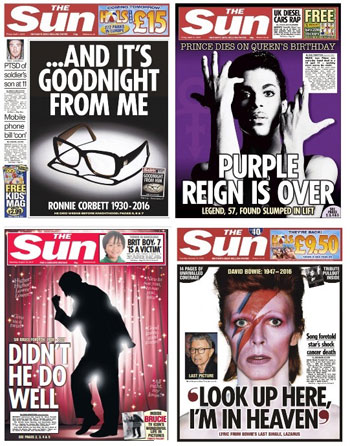

Miss of the week
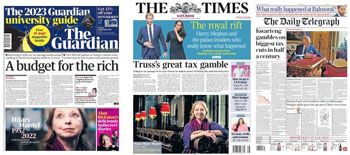
We’ve had a surfeit of royals. Not only the Queen’s death, lying in state and funeral, but renewed digs at the Sussexes and the Waleses’ first trip to their new principality. So, why did the Telegraph feel it necessary to make the King its main front-page image on Saturday? It was the day after the budget, so there was a lot going on. Kwarteng might have been the man perhaps. But there was a stronger candidate. Hilary Mantel rightly broke through the sirens and alarums in Westminster. She was a giant of literature and her death at 70 came as a surprise, so it was newsworthy in every sense. Yet she made not a sentence on the front of the Telegraph. What is it about culture that the paper doesn’t get?
Headline of the week
This in the FT on Saturday - although the sub stole it from Henry Mance’s text.
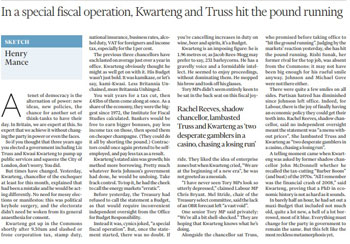
And this one...
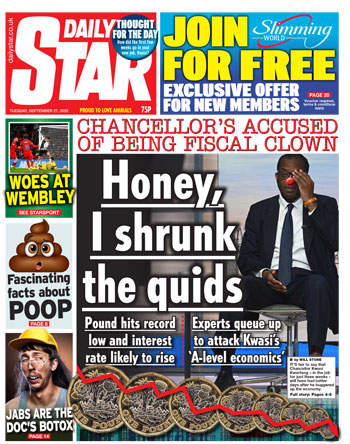
Front page of the fortnight
This from the Sun on the morning of the funeral was really classy.
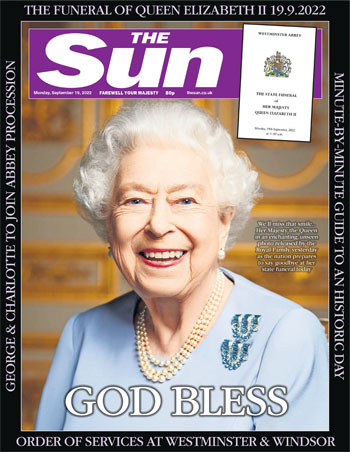
And it was flanked on Sunday and Tuesday by two more excellent fronts. Great work.

Liz Gerard’s Notebook is a fortnightly column published in the InPubWeekly newsletter. To be added to the mailing list, enter your email address here.












